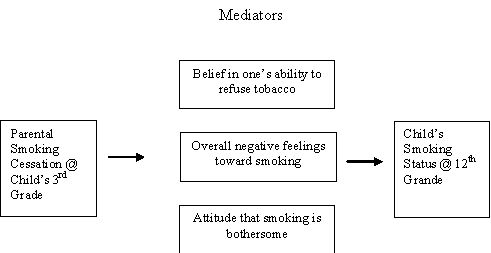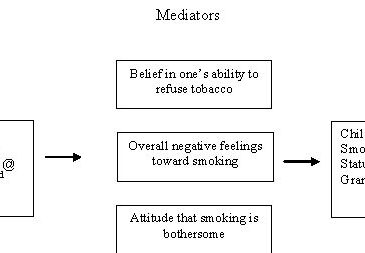Children whose parents quit smoking are less likely to become daily smokers than children whose parents keep smoking (Bricker et al., 2003). Perhaps watching a parent quit smoking changes children’s smoking-related beliefs in beneficial ways. For example, children who see their parents quit smoking might have stronger beliefs that they can avoid smoking. This week’s ASHES describes a longitudinal study that examines the extent to which children’s smoking-related beliefs mediate the effect of parental smoking cessation on children’s decision to start smoking (Wyszynski, Bricker, & Comstock, 2011).
Methods
- Participants
- Wyszynski et al. surveyed 2,656 third graders from 40 Washington State school districts. To be eligible for the study, students had to have at least one parent who was either a current smoker or a previous smoker. The final cohort consisted of 2,230 students (48% females, 91% Caucasian). About 86% of participants completed the ninth grade follow-up survey, and about 97% of those completed the twelfth grade follow-up survey.
- Major measures
- Parental smoking cessation by the time children were in third grade. For each child participant, one parent indicated the smoking status of both parents. The researchers used a binary coding scheme (i.e., assigning a “0” = one parent currently smoking and “1” = at least one parent who quit smoking but no parent currently smoking).
- Child smoking-related cognitions during ninth grade. The 8-item survey measured global attitudes toward smoking, intentions to smoke, normative beliefs about smoking, belief in one’s ability to refuse tobacco, and negative expectations about smoking.
- Child smoking status during twelfth grade. The participants self-reported if they smoke.
Results
- Children with at least one parent who quit smoking reported widespread healthier beliefs about smoking when they were in ninth grade.
- Children with healthier smoking-related beliefs in ninth grade were less likely to be daily smokers in twelfth grade
- Children with at least one parent who quit smoking were 30% less likely to be daily smokers in twelfth grade (odds ratio = 0.70, 95% confidence interval = 0.58-0.84).
- The influence of parental smoking cessation on twelfth grade smoking status was mediated by three significant factors that were measured during the child’s ninth grade (see Figure 1).

Figure. Mediator Variables for the Relationship between Parental Smoking Cessation Behavior and Children’s 12th Grade Smoking Status. Click image to enlarge.
Limitations
- Caucasians comprised 90% of the sample; this limits generalizability of the results.
- The researchers did not compare children of quitters and current smokers against children of parents who never smoked.
Conclusion
As predicted, children whose parents had quit smoking by the time children were in third grade were less likely to be daily smokers during the twelfth grade. Children’s healthier cognitions during the ninth grade appear to mediate this effect. These results have some implications for anti-smoking campaigns. First, smoking cessation programs targeted to parents should emphasize the role that parents can play in promoting negative attitudes toward smoking and increasing children’s confidence in their ability to refuse tobacco. In addition, these results highlight the importance of smoking-related cognitions among all children, even those whose parents continue to smoke.
–Julia Braverman
References
Bricker, J. B., Leroux, B. G., Peterson, A. V., Kealey, K. A., Sarason, I. G., Andersen, M. R., et al. (2003). Nine-year prospective relationship between parental smoking cessation and children’s daily smoking. Addiction, 98(5), 585-593.
Wyszynski, C. M., Bricker, J. B., & Comstock, B. A. (2011). Parental smoking cessation and child daily smoking: A 9-year longitudinal study of mediation by child cognitions about smoking. Health Psychology, 30(2), 171-176.
What do you think? Please use the comment link below to provide feedback on this article.





quit smoking nsw June 3, 2015
Parents who don’t smoke have high percentage their children won’t smoke also based on my experience.